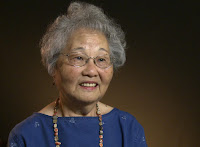June 22, 2009
Others, like Mary Yoshida, came to the Twin Cities with no direct connection to Ft. Snelling. Mary answered a newspaper advertisement and worked as a domestic for a wealthy Minneapolis family while she saved up money to return to college. After college, Mary became a social worker for the YWCA and organized activities for teenagers around the city. Yet, the language school still influenced her life, as she and her Nisei friends would attend weekly dances with the MIS soldiers. In fact, that is how she first met her husband.
Many of the Minneapolis narrators also came from farming backgrounds. Helen’s family operated a grape farm in Parlier, California, while Mary’s family was involved with truck farming in Medford, Oregon. The Alien Land Laws prevented Japanese immigrants (who were also ineligible for citizenship) from owning property, leaving Issei farmers with no legal protection. Bill Hirabayashi recounted his family’s 1920s court battle against the State of Washington, which later went to the Supreme Court, over land purchased by White River Gardens, a corporation formed by three Japanese American families in Thomas, Washington. Even though the Issei founders placed the property in the name of their eldest Nisei child (a U.S. citizen), the court still found the families in violation of the Alien Land Law and confiscated the land. Bill, younger brother of Grant Hirabayashi (interviewed by Densho in 2006), also talked about his childhood growing up in Thomas, Washington and resettling to Minneapolis after WWII. Like Helen, Mary, and other narrators, Bill told us that his family never returned to the West Coast because they lost their farm, home, and livelihood during the war.
In total, we interviewed 10 people and recorded over 17 hours of footage. Stay tuned for a recap of Tom’s interviews.


